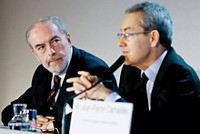Advertisement
Grab your lab coat. Let's get started
Welcome!
Welcome!
Create an account below to get 6 C&EN articles per month, receive newsletters and more - all free.
It seems this is your first time logging in online. Please enter the following information to continue.
As an ACS member you automatically get access to this site. All we need is few more details to create your reading experience.
Not you? Sign in with a different account.
Not you? Sign in with a different account.
ERROR 1
ERROR 1
ERROR 2
ERROR 2
ERROR 2
ERROR 2
ERROR 2
Password and Confirm password must match.
If you have an ACS member number, please enter it here so we can link this account to your membership. (optional)
ERROR 2
ACS values your privacy. By submitting your information, you are gaining access to C&EN and subscribing to our weekly newsletter. We use the information you provide to make your reading experience better, and we will never sell your data to third party members.
Business
ICI Accepts Sweetened Offer From Akzo Nobel
Takeover deal will mark the end of an icon of British industry
by Patricia L. Short
August 13, 2007
Akzo Nobel has made an official offer to acquire the U.K. specialty chemical company ICI. After spurning earlier overtures from the Dutch firm, ICI's board of directors has agreed to the deal and recommended that shareholders accept it.
The agreement followed Akzo's latest proposal, made last week, which valued ICI at just over $16 billion. This is a slight increase over a $15.8 billion offer floated the previous week and a 12% improvement from one made in June.
Akzo's sweetened offer was buttressed by a back-to-back agreement with Henkel, the German detergents and adhesives producer. Henkel will pay Akzo roughly $5.5 billion to acquire the adhesives and electronic materials businesses of ICI subsidiary National Starch & Chemical.
These National Starch businesses had sales of about $2.5 billion in 2006 and will increase Henkel's adhesives sales to nearly $10 billion, about half of its total sales. The German company says it expects cost savings of $325 million to $350 million from the acquisition.
ICI???s Dulux paint operations, meanwhile, will boost Akzo's coatings sales to about $13.5 billion per year, or between 10 and 15% of the global paints and coatings industry. Assuming it retains all the ICI businesses, Akzo will log annual sales of nearly $20 billion, a sizable jump from its 2006 paint and chemical sales of $12.6 billion.
With the acquisition, Akzo Nobel Chief Executive Officer Hans Wijers said at a press conference, "We will build one new company, and we will have to think very carefully about our branding." When Akzo merged with Nobel in 1994, the two names were simply combined. A third name, however, complicates things, Wijers said.
Annual pretax cost savings related to the Dulux business will reach nearly $380 million, Wijers said, and he expects other cost synergies from combining the two firms.
The Dutch company is paying for ICI from the $15 billion proceeds of the sale of its Organon BioSciences division to Schering-Plough. That deal will close "come hell or high water" by the end of this year, Wijers said.
The sale of ICI will mark the end of a bellwether of British industry, a petrochemicals-based conglomerate formed 81 years ago through the merger of four British producers of alkali chemicals, explosives, and dyestuffs. In 1993, ICI spun off its life sciences businesses as Zeneca, and in 1997, it acquired Unilever's chemical operations. It subsequently divested its petrochemicals business and, in the past few years, has sold the oleochemicals and flavors and fragrance operations acquired in the Unilever deal.
ICI CEO John McAdam conceded at the press conference that "it's a day of mixed feelings about seeing ICI cease to be an independent company. However, Akzo Nobel has today made a compelling offer which delivers full value for ICI."






Join the conversation
Contact the reporter
Submit a Letter to the Editor for publication
Engage with us on Twitter